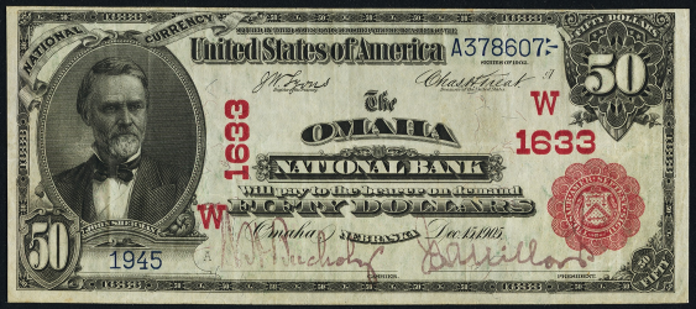Fifty Dollar Notes › Nationals › 1902 Fifty Dollar National Bank Notes › California Charters › 1902 $50 Concord California First National Bank
Get Value Now
| Item | Info |
|---|---|
| Series | 1902 |
| Charter | #9945 First National Bank of Concord, California |
| Year Chartered | 1911, 206 Banks Chartered |
| City Info | Concord is the largest city in Contra Costa County, California. At the 2010 census, the city had a population of 122,067 making it the 8th largest city in the San Francisco Bay Area. Founded in 1869 as the community of Todos Santos by Salvio Pacheco, the name was changed to Concord within months. The city is a major regional suburban East Bay center within the San Francisco Bay Area, and is 29 miles east of San Francisco. Source: Wikipedia |
| Similar Cities | If your note doesn't match try: 1. Concord, New Hampshire - First National Bank 2. Concord, New Hampshire - National State Capital Bank 3. Concord, Massachusetts - Concord National Bank 4. Concord, New Hampshire - Mechanics National Bank 5. Concordia, Kansas - First National Bank 6. Concordia, Kansas - Concordia National Bank 7. Concord, Michigan - First National Bank 8. Concordia, Kansas - Citizens National Bank 9. Concord, North Carolina - Concord National Bank 10. West Concord, Minnesota - First National Bank 11. New Concord, Ohio - First National Bank |
| Seal Varieties | Red, Blue |
| Other Info | 1. Value depends on notes known for charter, condition and market demand. |
| Neat Fact | Plate letters A-C for $50 Notes, A for $100 Notes (Friedbergs, 20th Ed. P 99) |
No Obligations Offers and Appraisals
Please submit a good photo or scan. It will be identified and evaluated. Understand there may be subtle differences between the image you see above and your note. Signatures, design, markings and note condition will determine the offer price. Notes in Uncirculated or better condition receive the best offers.
Appraisals can be estimated for wholesale and retail prices. Wholesale is what dealers typically pay. Retail is what a collector might pay. Retail is slightly higher in most cases.
Please visit this page for USA Paper Money Reference. Do not treat this page as a reference guide, it is for appraisal and acquisition purposes only.
